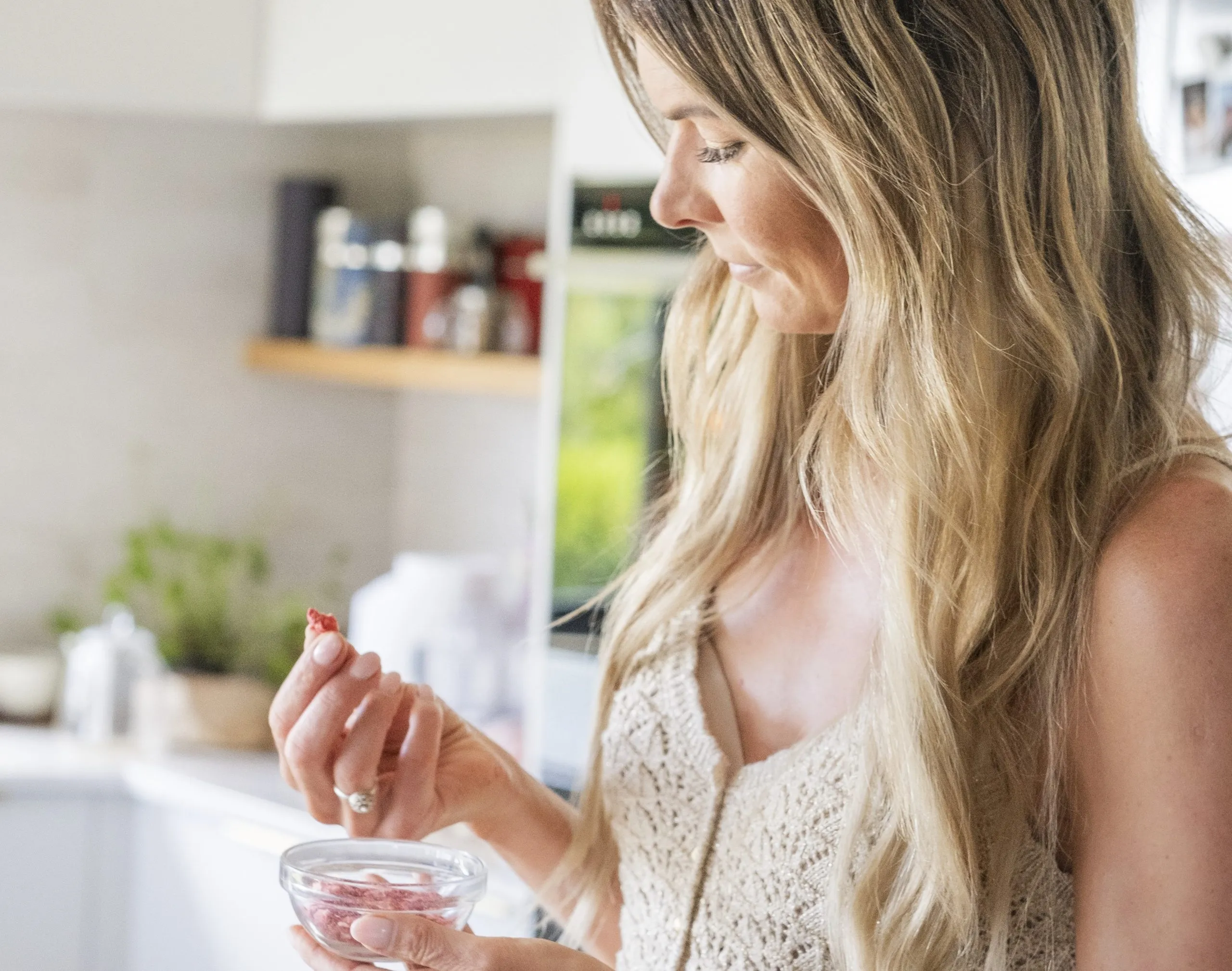Copyright newsroom

Goddammit, Chelsea Winter can do no wrong. I’m willing to die on this hill and after the muted reception to her last cookbook-but-one where she ditched meat, dairy and sugar in favour of plants, joylessness and sanctimony, it may be that I die up there alone. It’s too soon to tell if her latest book will right the wrongs of the past, but here I stand, planting the flag. There’s no logic to my feelings for Chelsea. I’m invested in her and root for her success, even though I didn’t watch MasterChef all those years ago, when she broke into the culture with her blonde hair and bogan-adjacent skinny jeans. To this day I don’t know what her voice sounds like. I walk past her kitchenware in supermarkets, unmoved; I’m not a follower of hers on Facebook, where she has a community of 400,000 devotees. And yet, I owe her. Her recipes are reliable and achievable for lazy-to-middling cooks like me. I own many of her books. They’re greasy, creased and full of crumbs. I take them down from the kitchen shelf and leaf through them sometimes, finding this soothing. Chelsea released her latest cookbook, Nourish, mere days after Taylor Swift dropped Life of a Showgirl. Chelsea is our Taylor: talented and photogenic, decades into her career and aware of her power, a brand as much as a human being, possibly referring to herself a little too often in the third person; rising above heartbreak and disappointment to convert bitter experience into something pleasurable her fans can stuff inside, swallow, and absorb. She’s 40, twice-separated, now a solo parent, and we are eating her feelings. Yet to stay so popular so long, Chelsea represents something more: solidarity. In the tradition of all our best-loved home cooks, she’s helping us solve a common problem. It’s the most domestic of bothers, of no interest to the public square but confronted by every kind of household across the motu at six o’clock each evening. It’s burdensome and existential, desolate, lonely and never-ending. It’s what to make for dinner. For many years this problem was entirely solved by the Edmonds cookbook. Then, in the age of television, Alison Holst became trusted with the nation’s nightly mealtime question and mostly, her answer was mince. This satisfied us. We were plain eaters, accustomed to boiled vegetables, corned beef and tinned peaches. We’d dug railways and roads, built state houses in matai and rimu, and flooded towns for hydropower on such dinners. Pressed-for-time families had their champions, too. Allyson Gofton’s Food in a Minute proved there were fifty-thousand ways to cook with baked beans, provided these were from Wattie’s. Sales of potato Pom-Poms went through the roof because in the nineties, who had the energy to mash? Just sling them on a cottage pie and shove it in the oven! How we loved her for simplifying our lives! We bought the cookbooks in droves, and her nightly infomercials ran for more than ten years. But somewhere between Alison, Allyson and today, New Zealand began wanting more from our home cooks. Honest, stodgy dinners were no longer a solution; in fact, they might be the problem. Cooking at home was going upmarket thanks to dazzling new stars like Nigella Lawson, who ended each episode of her TV series serving penne alla vodka to trendy friends in polo necks, underneath loops of twinkle lights. I suppose New Zealand’s Nigella was Annabel Langbein. Despite making much of her possum-trapping past, she was firmly aspirational in presentation. She had a light touch and perhaps was first to blanch, not boil, asparagus, opening us up to a new world of crunch. She looked like money and talked like she’d swallowed a set of Hepplewhite chairs. Her recipes were flameproof, but she left you feeling inadequate about your pantry items and where you went to school. And so, our cookbooks parted ways. The well-thumbed, daggy ones revealing the way we really ate were banished, winding up in the magazine racks at supermarkets. In came the era of coffee table cookbooks, revealing the way we wished we ate, if only we had the time, money and taste. Such books were about utility but also, display. We winnowed into tribes, dropping our preferred surnames at our dinner parties. “This is Ottolenghi,” we would say, sprinkling pomegranate seeds on the salad and za’atar over soup. It was performative. It was neurotic. It was about to get so much worse. By the time Chelsea arrived with her first, refreshingly normcore cookbook, we were all exhausted. Nigella was part of that — thanks to an embarrassing court-case, we’d learned she spunked £25,000 a year on flowers. For a while, her flourless chocolate lime cake with margarita cream stuck in our throats. Chelsea plugged a welcome gap. She used mince and sausages but always added a twist. She wrote breezily in provincial slang and didn’t take herself too seriously (Chelly Con Carne). She appealed to our national myth, that life could be beers and pies at the beach, fresh-caught fish on the barbecue, three or four generations of a family piled around the table for meals. Her own family was willing to take part in this, appearing in her books as extras. She made the news with her Snickalicious slice, which used enough peanut butter to feed a small, sovereign country; critics were sniffy about unhealthy amounts of fat and sugar in her cooking. What twerps they were! Didn’t they see these were the golden years, when we could all still afford butter? Anyway, she won back credit during lockdown with her yeast-free beer bread. What a relief this was for us, stuck at home with dwindling supplies! There she was again, classic Chels, solving our national problems. Her swerve towards plants took us all by surprise, but haven’t we all lost our minds when a new baby comes home? Pantry staples become fraught, loaded with hidden threats. Supergood was an oddly serious book, moodily shot. It featured Chelsea’s unsmiling partner Douglas, handsome enough to lie in the tussock and not look like a dork, but it captured none of the pleasures of food or company. Still, haven’t we all lost our minds in a relationship? It’s not as if the rest of us were less neurotic about food, which had become a collective psychodrama. We were learning what we ate affected not only our waistlines but our microbiomes, which in turn affected our brains. If we felt depressed, anxious, passive, hopeless, might it be our diets? And by extension, our fault? The food we ate acquired a moral component, signalling cleanliness, Godliness. To maintain our purity in an industrialised food system, we should make it from scratch. The truly blessed raised their food themselves, foraged for it. Somehow this yoked to rejecting fluoride in the water supply, vaccines, and a distrust of institutions. Dinner was getting political. But who hasn’t lost their minds, with the collapse of international rules-based order? And so, to Nourish. It sticks to the recognisable formula of earlier books. It’s beautifully styled and shot with Chelsea at its centre, bookended by sunlit photographs of her garden and sweet-faced young children. It features a unifying colour palette, this time soft yellows, oranges and browns. Chelsea has long, hot-tonged hair and wears a significant necklace, which might be a sunburst, or a dreamcatcher. There are two sewn-in ribbon bookmarks, an introduction heaping thanks on her readers and an acknowledgments list lardy with gratitude, mostly for the women in her life. (Screw you, Douglas.) Nourish is a pivot back to meat, eggs, dairy and fish, she announces. Plant-based food is still important, but everything in moderation, because who doesn’t love an egg? I can’t tell you what a relief this is to me, who still has PTSD from Supergood’s hemp seeds and jackfruit. There are recipes for slow-roasted and Moroccan lamb, creamy French chicken, beef hotpot, fish cakes. Praise be, there are meatballs, and she uses sausages again; her treats section is the largest of all, at more than fifty pages, although the recipes feature coconut sugar, dates and maple syrup as sweeteners. Refined sugar is out, along with a catalogue of other horrors listed at the back. Chelsea takes the need for gluten-free, dairy-free and nut-free recipes seriously, unlike many of her rivals. As a coeliac, her GF tortillas, cheesecakes and scones make me weak with gratitude. There’s a nice celebration section and a show-stopping chocolate cake. I’ll give millet a crack, as she suggests; it might sex up my boring breakfasts and add heft to dull dinners. She says so in her confident introduction: “I’ve never been more excited about a book — I know how many lives it will change, how much good it will do.” But also, with less jollity: “Our health is in our hands, and the food we eat is the cornerstone.” Yet, it’s a little thin. There are twenty dinner recipes, compared to nearly fifty, including salads, in Tasty. Some dishes are simplistic and use up valuable space (fruit kebabs, banana milkshakes). Others seem wishful rather than realistic (slice an apple to look like a bagel; dress it with chia jam and hemp seeds). Too many pages are given over to remedies, like old-school poultices and gummy sweets for gut health and immunity. Oddly, these contain the animal byproduct gelatine. This section begins with a disclaimer, as well it should. I’m menopausal enough to know there’s trouble ahead and in one’s fifties, grated potato in a twist of muslin isn’t going to cut it. With the gift of foresight — I have ten years plus on Chelsea — I’d like to tell my old mate, what? That seed oils and iodised salt are the least of our problems? No; it’s that this need for control will pass. Eventually, your children will release their gravitational pull on you; you, presently a moon to their planet, existing solely to orbit and gaze upon them. Your universe will expand and with the perspective of other bodies in space, you will see yourself for what you are, and how far you’ve floated from who you were. You may even learn to enjoy the inky, star-spotted silence, and the distance widening between you and them. Don’t worry about this loosening, this loss of magnetism, because they’ll always see your shine, even light years and galaxies away. But I don’t have time to talk to her like this. I just need to know what to make for dinner. The new cookbook Nourish by Chelsea Winter (Allen & Unwin, $49.99) is available in bookstores nationwide. In recognition of her genius, ReadingRoom is devoting all week to coverage of Winter’s latest collection of recipes, which went straight to Number 1 with a bullet in the NielsenIQ BookScan bestseller chart. Monday: an exclusive personal essay by Chelsea Winter on her reasons for returning to meat. Tuesday: Julie Biuso reviews Nourish. Wednesday: Steve Braunias on Chelsea’s classic dish Oozy Quesadillas. Tomorrow: We conclude our week-long series by announcing the winner, and her lovely entry, of a giveaway contest to win a signed copy of Nourish.



